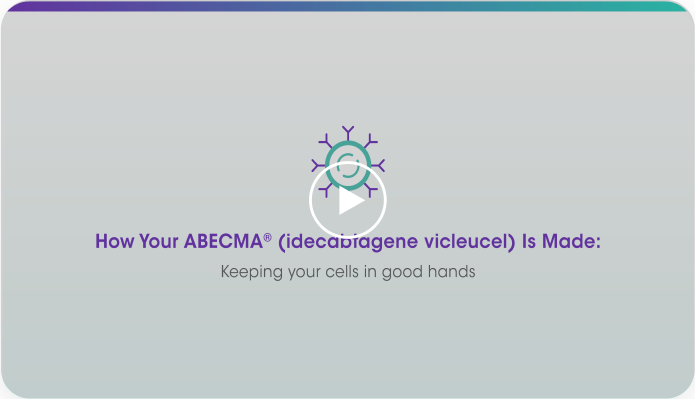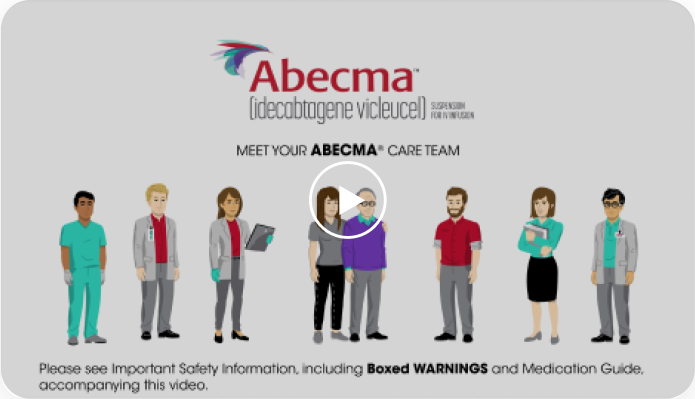INDICATION
ABECMA (idecabtagene vicleucel) is a B-cell maturation antigen (BCMA)-directed genetically modified autologous T cell immunotherapy indicated for the treatment of adult patients with relapsed or refractory multiple myeloma after two or more prior lines of therapy, including an immunomodulatory agent, a proteasome inhibitor, and an anti-CD38 monoclonal antibody.

This website is best viewed using the horizontal display on your tablet device.

This website is best viewed using the vertical display on your mobile device.
ABECMA® Information and Resources for Nurses
You play a critical role in the ABECMA treatment process, helping RRMM patients navigate their journey with ABECMA. Get information and tools you need below to help support your patients.
From the treatment process to adverse event monitoring and management information, it’s here—so you can continue to guide your patients throughout their treatment journey.
RRMM=relapsed/refractory multiple myeloma.
Depend on the ABECMA Treatment Process—Backed by Extensive Real-World Experience in RRMM1*
What freedom could mean after a one-time infusion† of ABECMA1
While regular check-ins and long-term monitoring with their healthcare team are still required, the following are NOT required for your patients with RRMM while they are responding to ABECMA:

Repeated infusions

Maintenance therapy

Daily pills
Defined as being in market since 2021 as the first CAR T cell therapy in RRMM.
Treatment process includes leukapheresis, manufacturing, administration, and adverse event monitoring. A single dose of ABECMA contains a cell suspension of 300 to 510 x 106 CAR-positive T cells in one or more infusion bags.1
Help your patients understand the ABECMA treatment process and the care team they may encounter throughout their journey
The ABECMA treatment journey requires close collaboration between a patient's primary oncologist and a certified ABECMA treatment center.
The Learn How ABECMA Is Made video can help your patients understand the ABECMA manufacturing process

The Meet your ABECMA Care Team video can help educate your patients on the trained professionals they may encounter


The ABECMA treatment process
See a summary of select steps of the ABECMA treatment process below.
-
Patient eligibility and initiation1
- Eligible adult patients include those who are triple-class exposed (patients who have received an IMiD® agent, a PI, and an anti-CD38 monoclonal antibody) and who have received at least 2 prior lines of therapy
-
Leukapheresis1
- T cells are collected via leukapheresis
-
Manufacturing1
- The patient’s cells are sent to a manufacturing site for engineering and expansion to the recommended dose
- ABECMA is an autologous product; the manufactured dose for individual patients may vary
- The patient’s recommended dose is 300 to 510 x 106 CAR-positive T cells
- Bridging therapy can be used in some patients at the physician's discretion for disease control during the manufacturing process
94%
commercial manufacturing success rate2‡
-
Shipping and receipt1
- To ensure patient safety, Bristol Myers Squibb requires chain of identity (COI) at 4 key points in the treatment process: when receiving the LN2 dry vapor shipper; after transferring ABECMA to on-site storage; prior to thawing ABECMA; and prior to ABECMA administration
- On the scheduled date, ABECMA will be shipped directly to the infusion site’s assigned address and/or department, as specified on the Cell Therapy 360® Scheduling Portal
- Cryopreserved ABECMA will be shipped to the treatment site in an LN2 dry vapor shipper
-
Storage1
- The method of storage will depend on the individual site's capabilities: just-in-time delivery (ABECMA arrives on or near the date of infusion and remains in the LN2 dry vapor shipper until the product is thawed for patient administration) or on-site storage by preapproved process (ABECMA is transferred to on-site vapor-phase LN2 storage)
-
Lymphodepleting chemotherapy1
- Begin administration of lymphodepleting chemotherapy 5 days before the patient’s scheduled ABECMA infusion (fludarabine [30 mg/m2 IV infusion] and cyclophosphamide [300 mg/m2 IV infusion] daily for 3 days)
- The care team is notified of the estimated ABECMA delivery date. Product availability should be confirmed prior to starting lymphodepletion
- Across registrational studies, MM bridging therapies (following leukapheresis) were stopped ≥14 days prior to lymphodepleting chemotherapy
Lots manufactured between January 2023-November 2023. Manufacturing success rate is calculated as patients successfully treated with conforming product/patients apheresed.2
-
Premedication1
- Approximately 30 to 60 minutes before ABECMA infusion, administer acetaminophen (650 mg orally) and diphenhydramine (12.5 mg IV or 25 to 50 mg orally, or another H1-antihistamine). Avoid prophylactic use of dexamethasone or other systemic corticosteroids, as they may interfere with the activity of ABECMA
-
Thawing1
- Each infusion bag must be infused within 1 hour of the start of its thaw
- See the ABECMA Clinician Guide for detailed instructions on thawing ABECMA infusion bags
-
Infusion1
- Administer ABECMA 2 days after the patient completes lymphodepletion
- Step 1: Infuse the contents of the infusion bag by gravity flow
- Step 2: After the entire contents of the infusion bag have been infused, flush the tubing with 30 to 60 mL of normal saline at the same infusion rate to ensure all the cells are delivered
- Step 3: If more than 1 infusion bag is being administered, repeat the procedure (thawing through saline flush) to administer subsequent infusion bags of ABECMA in series
- Keep the remaining bag(s) in LN2 storage until prior bag has been infused and patient is ready; proceed to the subsequent infusion bag based on clinical judgment
- Delay the infusion of ABECMA up to 7 days if a patient has any of the following: unresolved serious adverse events (especially pulmonary events, cardiac events, or hypotension), including those after preceding chemotherapies, active infections, or inflammatory disorders
- ABECMA is provided as a single dose for infusion containing a suspension of CAR-positive T cells in 1 or more infusion bags
WEEKS 1-2
Initial Monitoring
- The care team will monitor patients for signs and symptoms of CRS and neurologic toxicity at least daily for 7 days following infusion
- Treat at the first sign of CRS or neurologic toxicity as needed based on the grading and management guidelines
Treatment center staff will work together to manage and treat any symptoms that may arise.
Instruct patients to remain within proximity of a healthcare facility for at least 2 weeks following infusion
Topics to discuss with your patient and their caregiver
- Alerting their healthcare provider or getting emergency help right away if they have symptoms of CRS or neurologic toxicity
- Attending appointments at the treatment center
- Refraining from driving for at least 2 weeks following infusion
Topics to discuss with your patient's caregiver
- Calling the ABECMA care team if the patient experiences any symptoms
- Taking the patient to scheduled appointments at a healthcare facility
WEEKS 2+
Long-term monitoring
- Instruct patients to remain within proximity of a healthcare facility for at least 2 weeks following infusion
- After at least 2 weeks of monitoring, your patient may return to their primary oncologist for continued monitoring and routine care appointments
- Patients treated with ABECMA may develop secondary malignancies. Monitor life-long for secondary malignancies. In the event that a secondary malignancy occurs, contact Bristol Myers Squibb at
1-888-805-4555 for reporting and to obtain instructions on collection of patient samples for testing of secondary malignancy of T cell origin
CAR=chimeric antigen receptor; CRS=cytokine release syndrome; IV=intravenous; LN2=liquid nitrogen; MM=multiple myeloma; PI=proteasome inhibitor.